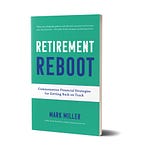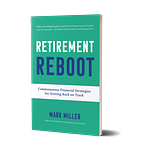
This week, I’m releasing the latest in the retirement guide series. This one explains how to deal with the Social Security Administration during the COVID19 crisis.
The guides usually are available only to paid newsletter subscribers, but I’m making this one available free to anyone who signs up for the paid or free versions of the newsletter.
The guide looks at how customer service at the Social Security Administration has changed during the coronavirus crisis, and how to get business done there. Social Security closed its network of more than 1,200 field offices to the public in March, 2020. Staff members are seeing people in person at the field offices for a very limited number of transactions. Social Security is handling most routine business via its toll-free line (800-772-1213) and its website. The guide also spells out what Medicare covers that is related to COVID19 - and the changes the program has been making to respond to the emergency.
Finally, the new guide also looks at how the crisis has added a new dimension to strategies for smart Social Security benefit timing decisions. And that’s the focus of this week’s podcast - click on the player icon above to listen. The podcast also can be found on Apple Podcasts, Spotify and Stitcher.
Other guides in the retirement series cover topics like Medicare enrollment, the cost of healthcare in retirement and how to hire a financial planner. Click here if you’d like to learn more about becoming a subscriber to the free or paid editions of the newsletter.
When you sign up, I’ll email a copy of the new Social Security guide to you as a downloadable PDF.
Pension plans and the downturn
Investing guru Bill Bernstein has compared investors in defined-contribution plans to airline passengers sent to the cockpit to fly the plane. Bernstein would much prefer a retirement system that relies on defined-benefit pensions, with their professional management and automatic participation.
The unfolding coronavirus crisis underscores the value of professional pension pilots -- and the structure of defined-benefit plans, which don't rely on short-term market performance to meet near-term obligations. The same claim cannot be made for the 401(k) or IRA accounts of investors who are retired or close to retirement. Such investors are facing tough questions now about the reliability of their portfolios.
While there's no immediate danger that defined-benefit pension plans will fall short of resources to meet obligations during the pandemic crisis, many are taking their lumps as financial markets tumble. And the knock-on effects of the economic downturn could pose long-term challenges for pension plan sponsors as they try to meet their obligations to participants.
The situations vary among the key pension sectors--corporate, multiemployer, and public. Learn more in my latest Morningstar column.
Subscribe now
If you haven’t subscribed to the newsletter give it a try if your finances permit in this tough economy. You’ll be supporting independent journalism dedicated to covering what matters for older Americans. Subscriptions cost $5 per month or $60 year, and you can cancel at any time.










